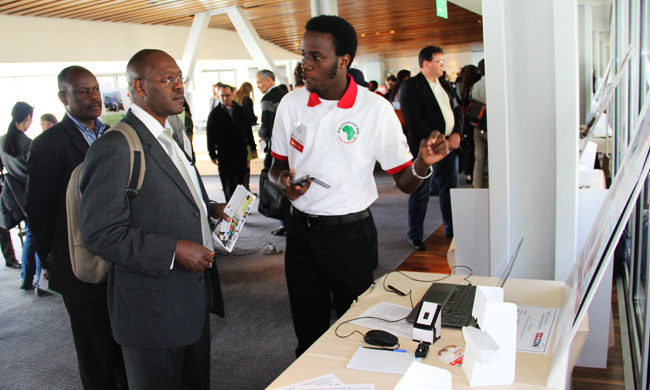This year, the second annual technical convening TechCon2014, held from November 8th-10th, 2014 in the Bay Area, California, showcased more than 40 innovations emerging from USAID’s Higher Education Solutions Network (HESN) Development Labs and partners. TechCon2014 was proudly hosted by the University of California, Berkeley in the United States of America. TechCon2014 offered a variety of both group and one on one discussions, networking opportunities, conference sessions, and talks by leading voices in development. Additionally, TechCon2014 uniquely convened researchers, students, entrepreneurs, innovators, field practitioners and private/public sector professionals focused on creative approaches to solution ideation, testing, and scaling for international development.
Eight university-based labs comprising USAID’s HESN participated in this technical convening. These included the following;
- University of California, Berkeley’s Development Impact Lab
- Duke University’s Social Entrepreneurship Accelerator
- MIT’s International Development Innovation Network
- MIT’s Comprehensive Initiative on Technology Evaluation
- College of William and Mary’s AidData Center for Development Policy
- Texas A&M University’s Conflict and Development
- Michigan State University’s Global Center for Food Systems Innovation
- Makerere University’s ResilientAfrica Network (RAN), based in Uganda

The climax of TechCon2014 was an Innovation Marketplace to showcase innovations. Eight teams of innovators from Makerere University’s ResilientAfrica Network (RAN) including Cost effective and efficient phototherapy units, ‘Dduka’ Landslide Early Warning System, The Asthma Grid, Grain Amaranth: from Vegetable to Health Solution, Hydroponic Fodder Production for Livestock, K-Free: Early Breast Cancer Diagnosis, Unearthing the potential of earthworm domestication and the Ethio-Manual Oxygen Backup device (EMOBD) participated in the technical convening Innovation Marketplace. This was concluded with one young innovator being crowned the top winner through a Shark Tank style competition.
In the Innovation Marketplace, each participant received $1000 Development Dollars that was to be used to vote for one’s favorite project or projects. It was entirely up to the participant to decide on how best to use these Development Dollars to support the ideas and projects in the Innovation Marketplace; you could invest all the dollars in one project, split your money between ten projects or invest at levels somewhere in between. The Development Dollars were later counted and the top nine teams in which Makerere University’s Hydroponic Fodder Production for Livestock a project from the College of Veterinary Medicine, Animal Resources and Bio-Security also emerged, proceeded to the next round-the Technical Review Panel. It was exciting to witness Makerere University Resilient Africa Network (RAN) including Hemafuse: Auto transfusion for Internal Hemorrhages and Purdue:
The Practical Utility Platform second-USD 1,250 (both partners are not directly under the Higher Education Solutions Network-HESN) and
Makerere University, the only African based HESN Lab emerged third triumphing with USD 750 outstandingly leading the other HESN Labs. These funds are towards further development of these projects aimed at responding to communities’ development challenges. Such projects also benefit from the visibility, mentorship and incubation opportunities within the greater HESN and at the RAN Resilience Innovation Labs. “It is amazing how much potential is in this great institution, we all need to explore, build and support it further” remarked Prof. William Bazeyo, Dean
Makerere University School of Public Health and RAN Chief of Party/Lab Director.

The Makerere University team was led by Prof. Barnabas Nawangwe, Makerere University Deputy Vice Chancellor in charge of Finance and Administration and RAN Patron. While interacting with the student innovators, he commented “Young men and women, our future is in your hands, Innovations is the way to go and Makerere University has been committed to supporting and nurturing innovations since 1922, the ball is in your courts to make use of all the available opportunities to develop solutions to African communities’ most pressing challenges”. Prof. David Serwadda, RAN Technical Advisor, the Resilience Innovation Lab (RILab) Directors (Eastern Africa, West Africa, Horn of Africa and Southern Africa RILabs) and faculty were part of this team in support of innovations as solutions to development challenges.
The TechCon2014 sponsors including VENTUREWELL, the Lemelson foundation-improving lives through invention, World Vision, the Development Impact Lab and the Higher Education Solutions Network cannot go without mention. Thank you for the commitment to accelerating Global Development.
Article by ResilientAfrica Network (RAN)


 General1 week ago
General1 week ago
 Natural Sciences2 weeks ago
Natural Sciences2 weeks ago
 Agriculture & Environment1 week ago
Agriculture & Environment1 week ago
 Health2 weeks ago
Health2 weeks ago
 Health2 weeks ago
Health2 weeks ago


